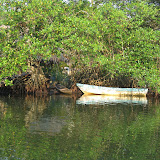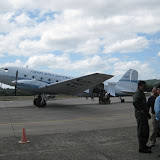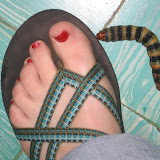 |
| Sarstun y Paracaidistas |
I returned from my quick trip to the states on a Monday, and the next village team was to arrive the following Saturday. Normally, each group has a leadership team which arrives here in Antigua the Wednesday or Thursday before everyone else’s weekend arrival. This mainly includes a Logistics Director, a Team Facilitator and a Team Administrator. These people all have very carefully defined roles in preparing for the trip and ensuring that things run smoothly while in the field. It’s very difficult to say that any one or two jobs are the most important positions on the team, since there really are no extra people, but if one was really pressed to identify a top-five list these guys would be on top. I did help pack and organize some things before the Peten trip, but the team leadership took care of most of those things.
The Sarstun trip, unfortunately, was another story. It just so turns out that this particular group of individuals decided to forgo the usual protocol. Rather than providing a leadership team, they simply ignored the idea entirely, expecting for all of the heavy lifting to be taken care of upon their arrival. Hand in hand with a total unwillingness to complete the numerous highly important preparatory tasks which they had been assigned, the team leaders seemed to expect for some magical Guatemalan-Medical-Mission-Equipment-and-Foodstuffs-Purchasing-and-Packing Fairy to simply make sure things were done. Huh. If you’re thinking “looks like a job for Jenna!” you’re not the first person to have reached that conclusion.
I spent the week prior to the jornada’s start running around Antigua, frantically checking things off of forever multiplying lists, sorting and packing and lifting and purchasing and calling and meeting and running running running. The honest truth is that I didn’t mind, at the time. I was fully aware of the importance of my job, and it probably wouldn’t be far from the truth to say that I was proud of being entrusted with such responsibility. Clearly the people I’m working with must trust me, if they gave me all of these jobs. In a paradoxical sort of way, it’s like earning the opportunity to work really hard. Anyhow, I was sure that the team would be grateful when they saw how much legwork had been done before their arrival, and that was encouraging to me. Sadly, that hope did not come through. Rather than appreciating the volunteer – let me reiterate that – I’m a volunteer. As in, a person working more than full-time for absolutely no compensation, out of a desire to help the people of Guatemala ¬– they were actually angry with me! I’m not even kidding! The first thing the wife of the husband/wife leadership team did when we met was berate me, apparently as a representative of the greater Faith in Practice institution, for packing the wrong foods for the week. I was just following the very detailed, very official list which I had been given. I made absolutely no decisions in the process, yet apparently the ratio of crunchy to smooth peanut butter was a friggin’ crisis. When I say berate, I’m not talking about a simple “Jeeze! No one likes smooth peanut butter!” This was a full-scale, finger poking at my chest, raised voice, red faced sermon which criticized my audacity in assuming to know what this team would want to eat for lunch on Monday afternoon. Whew. That was before we even made it in the doorway.
I could go on and on, but it would be pointless. Basically, they were difficult people to work with, and that fact sucked a lot of the fun out of the trip. It only got worse as the week wore on, and although none of them will ever know it, I was secretly in tears on more than on occasion.
But enough complaining.
This particular jornada called for some very innovative, and exciting, travel arrangements. As we had done to reach the Peten, we once again flew on an Air Force transport plane from Guatemala City. This time we flew to Puerto Barrios, a port town in the Bay of Honduras, on the Caribbean coast. From there, the whole team and all of our gear crossed the bay in a Guatemalan Navy PT boat, arriving in the town of Livingston, at the mouth of the Rio Dulce. We stayed two nights in Livingston, a dirty little town where an American tourist was brutally machete-hacked to death last summer. We didn’t spend much time sightseeing.
The temperature never strayed far from the high nineties throughout the week, and neither did the humidity. We awoke early the first two mornings, breakfasted on fresh cantaloupe, pineapple, zapote, and mango, and then boarded Somalian pirate boats (not even kidding) from the roomside-dock. We then ventured into the open ocean, speeding along as if pursing a British yacht, bouncing in the waves and enjoying the early morning spray of Caribbean Sea in our faces. The boat ride lasted approximately forty-five minutes in the mornings, and half of all eternity on the afternoon returns (more on that later). Upon traveling the entire remaining Guatemalan coastline, our pirate boats navigated their way into the Rio Sarstun, a river which creates the border between northern Guatemala and southern Belize. From there, we cruised up the river roughly a kilometer before reaching the tiny town of Sarstun, accessible only through local waterways. We set up camp in a fairly well equipped medical clinic, and saw several hundred patients in two days. The truth is that the final numbers were a bit disappointing, in a paradoxical way. There were very few surgical referrals compared to other jornadas, due to the fact that Faith in Practice has been present in the area for about five years. Obviously this is good news; the people of the area with the most dramatic cases have already been taken care of! However, we couldn’t help but feel a bit dissatisfied with such healthy people. FIP plans to hold off a few years before bringing back another village team.
The boat rides back to Livingston each evening were one of the most miserable transportation experiences I have ever had. An early evening wind picks up around 4:30 each day, generating powerful whitecaps pushing opposite our direction of travel. The little ponga boats we rode act somewhat like a lever when zipping along through the ocean – the motor end buries itself in the water, and the front end sticks up several feet into the air. Those unfortunate souls seated in the front (I happened to be captain of this population the first day – the foremost person in the boat) literally fly as the boat slams into whitecaps, then drops into the valley formed behind. The first day, I was seated on a cooler in the front, grasping onto a tied-down buoy for dear life, bouncing several feet into the air and slamming back down on the Igloo with each wave. Several times I was afraid I would actually bounce right out of the boat and into the water, although that option seemed much better than the alternative of struggling to remain torturously inside. By the time we arrived back at the dock, I was certain I could survive 8 seconds on a bull better than any cowboy at the NPRA.
The third day we woke before daylight again, this time packing all of our things and bringing them along. We once again loaded into the ponga boats, although this time we headed up the Rio Dulce instead of out to sea. We took a breathtakingly gorgeous early morning ride through the canyons of the Rio Dulce, in a setting which brought to mind a tropical version of Montana’s Gates of the Mountains. After roughly an hour’s time on the river we arrived in the town of Rio Dulce, where we transferred everything once again, this time loading the trunks full of equipment into a waiting van. We road inland an hour and a half before finally arriving at the town of Paracaidistas (Eng: The Parachutists), where we set up shop once again.
The subsequent two days at Paracaidistas were interesting. Business was slow, as the local network coordinator had failed to publicize the correct date for the clinic. Nonetheless, we managed to end each day in a state of absolute exhaustion, thanks to the insufferably hot weather and continually grumpy attitudes of some of the team members. Thursday, the final day of the trip and Day 2 in Paracaidistas, two social workers from a nearby town brought in three severely sick children. I was the first FIP team member to meet them, as I saw them all in triage. One was a young girl – I think she was seven or so – with obvious congenital defects and noticeable retardation. She was very small for her age, although her head was huge, and her limbs we curled up into her body. The cornea of one eye was scarred white, and there was some sort of fistula below her nose, to name a few of the most obvious problems. In addition to that child, there were two infants – one of them roughly a year old and clearly dangerously malnourished. The baby’s limbs were tiny sticks, her face had the characteristic aged look of a severely emaciated child and her mouth was overtaken by thrush. The pediatricians quickly diagnosed her with an imperforated anus – a rare condition which is usually caught and surgically corrected within hours after birth. She was referred into the Obras Sociales hospital here in Antigua, first for treatment in the malnutrition center, in order to recover enough for her surgery. When the baby arrived here earlier this week, the Guatemalan doctors took one look and immediately ordered an HIV test. Sure enough, she was positive. She’s currently in the National Hospital in Antigua, since the Obras hospital doesn’t treat HIV/AIDS patients, but she’s not expected to live much longer. It was a rude awakening in several respects – first of all, that the health situation in this country is still so bad that such major defect such as an imperforated anus can go untreated for over a year, and secondly that a child like her could also have HIV. The subject didn’t even come up with the American doctors while I was speaking to them about her in the field; I don’t think it really even occurred to them that she might have the disease. At home, it’s not one of the first things you consider, apparently. This really is still a third-world country, despite the fact that we’re eating uncontaminated food, sleeping in hotels with air conditioning and being treated like celebrities at every town we arrive in.
The third child was the worst of the three. He was a two month old baby with a cleft palate, and severe malnutrition. I walked the mother and child back to the pediatricians, where he was soon diagnosed with pneumonia on top of everything else. He was cyanotic upon arriving, and was clearly in a very bad state. He was immediately started on IV Rocefen (a powerful antibiotic), and arrangements were made to have him admitted to the nearest hospital the same day. We broke for lunch as the mother waited outside for the transportation we’d arranged to arrive.
Upon finishing our guacamole-tuna fish–jalapeno sandwiches (you have no idea how delicious they are), we began filtering back into the general mêlée outside of the kitchen. One of the pediatricians stopped by to check on mother and baby, only to discover that he was dead. Feet from where we had calmly been eating lunch, savoring and socializing, the boy had died. Despite his grave state upon arrival, we were shocked.
I’m not entirely how or why, but somehow I was ushered over to sit next to the mom, and comfort her. In retrospect, I think that it’s probably due to the fact I’m one of the more fluid Spanish speakers – no one who stumbles over their Spanish words in perfectly casual conversation wanted to struggle with consoling a mother rocking her dead baby. Of course, it was the last thing I felt qualified to do, but despite that fact I was pushed through the tiny crowd of people hovering and sat down in the molded plastic chair alongside her.
What do you say? What do you do? Does anyone know how to act in that situation? Anyone? What could possibly hurt more, in the whole wide world, than the brutal injustice of losing life before it’s even begun? How can you tell a mother that things will be ok, that life will go on, that eventually the pain will subside? I don’t believe it – how can I expect her to? Do you tell her that her baby is being rocked in the arms of God right now? How can that be, when he’s still clearly being rocked in her own arms? Do you hug her? Cry? Pray? Scream with the pain, the actual physical pain in your chest and your stomach and your heart and every bone of your body, the pain that you’re feeling for her, and for him? How did this just happen?
I don’t really know what I said, or what I did. I sat with her, I talked to her, I answered all of the questions that I could and told her that God loves every single one of His children, and that the only thing she can do is be grateful that He shared this one with her and her family for a short time. I hugged her, and held her hand, and wiped her tears, and kept back my own until later, when I went to the kitchen and sobbed with our team pastor and cook, Barbara.
A cleft palate. That’s all he had, at first. And thanks to all of the complications from this simple, correctable condition, he died. We’re still in Guatemala, after all.
It wasn’t a miserable jornada, although this blog entry would make that appear to be the case. As always, there were beautiful, healthy babies to play peek-a-boo with, there were eternally grateful women who’d been suffering from uterine prolapse for 20 years and were now going to receive a free surgery, there were young girls with strabismus who would soon have a normal facial appearance and Guatemalan army soldiers with AK-47s and venereal disease who would be itch-and-discharge free within a few short days. There is no better feeling than that which you get from really helping people who need and appreciate it, and we did a lot of that in four days. It just also included some rude awakenings, and some learning experiences in subjects which I never intended to study. For better or for worse, there’s never a dull moment in Guate.




